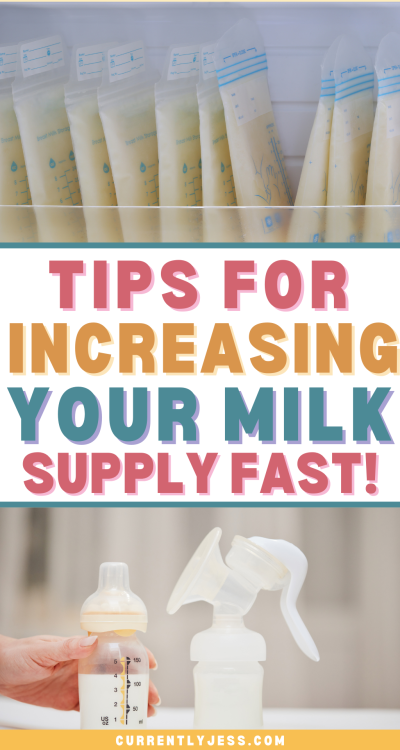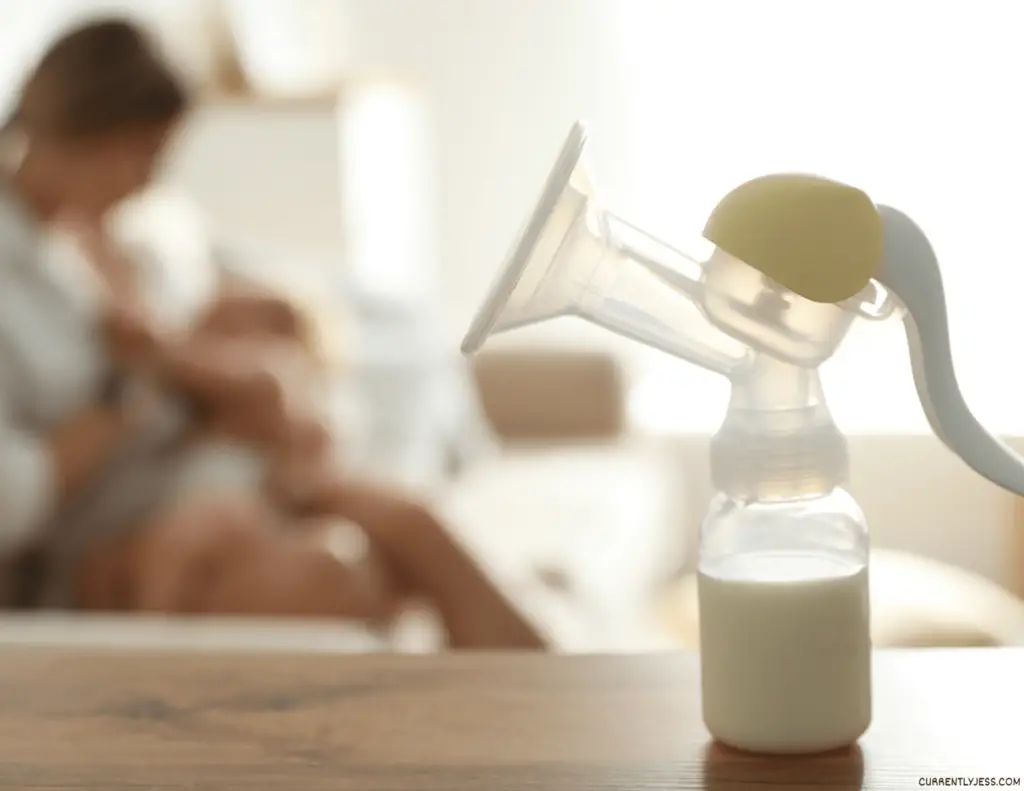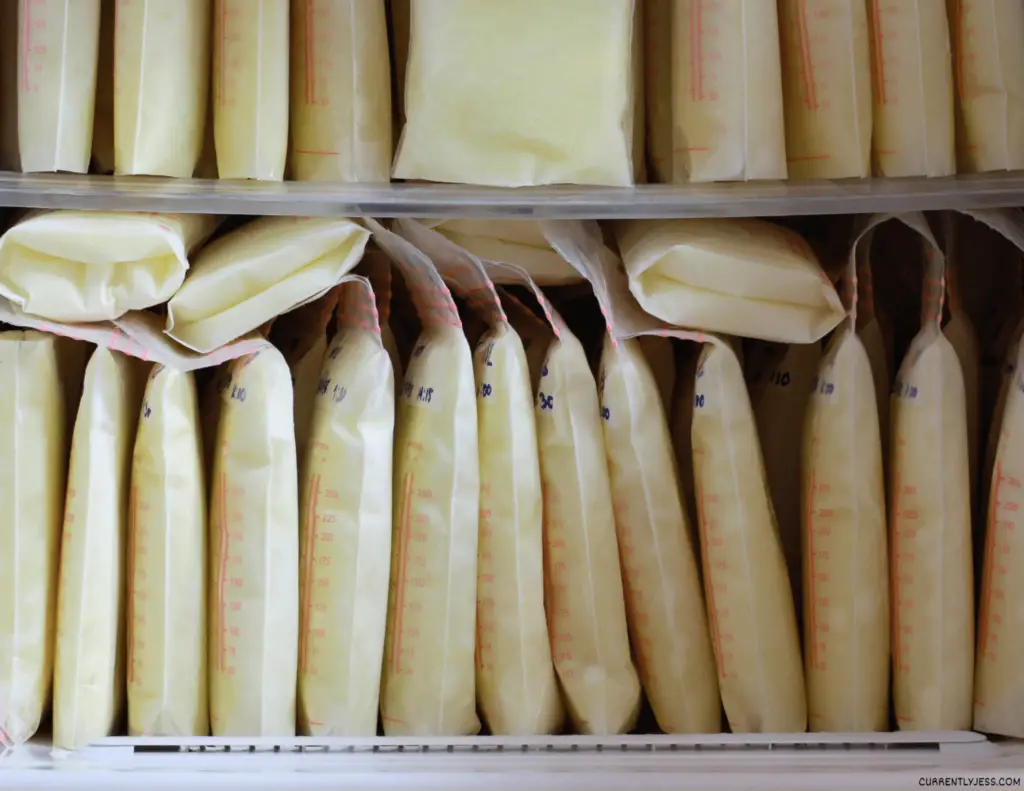Last updated on July 9th, 2024 at 02:06 pm
One of the hardest parts about being a new mom can be breastfeeding. And a low milk supply can add stress to an already difficult situation. You want to make sure your baby is getting plenty to eat to continue growing. But is your milk supply actually low? And what can you do to increase it quickly?
Let’s dive into all things milk supply and how you can boost your breastmilk effectively.

Disclaimer: This post may contain affiliate links. If purchases are made through these links, I may receive a small commission at no additional cost to you. Thank you for supporting this site.
In this post we will talk about:
- How you know if your supply truly is low?
- The causes of a low milk supply
- Methods of increasing your milk supply

How do you know if your supply really is low?
There are plenty of ways to increase production, but let’s evaluate whether you actually have a low supply or not. The two biggest factors in determining if your baby is getting enough to eat is:
- Weight gain – at regular well child visits you baby’s weight will be checked and compared on a growth chart. If there are any concerns, you pediatrician will let you know and you can make a plan together. However, if you are in between appointments, you can always call your doctors office with your concerns and request a weight check.
- Number of wet and dirty diapers – a typical baby past the newborn stage has anywhere from 6-10 wet diapers a day. But every baby is different. If you notice a decrease out of the normal for your child, this could indicate dehydration and low milk supply
If both are normal, then your baby is getting plenty to eat. It is common to think your supply is low when baby has an increase in nursing or is fussier than normal. There are plenty of other reasons for these, the top being a growth spurt, so don’t be alarmed. Fussiness does not necessarily equal hunger.
Causes of Low Milk Supply
Alright, now that we have determined that your supply could be low, what are the reasons for this? There are a lot so buckle up!
You’re stressed – having a baby is stressful! And it is normal to feel overwhelmed. High stress levels can directly affect your ability to take care of yourself through eating and drinking enough and getting enough rest, which can decrease your milk supply.
You’re tired – Who isn’t tired when having a baby? Over exhaustion and lack of energy reduces your body’s ability to produce enough breastmilk.
You’re not drinking enough water – breastmilk is 80% water, so you need to drink plenty of it to produce milk for your baby.
You’re not eating enough calories – your body needs both calories to produce and calories to go into the breastmilk for your baby. You should eat approximately 500 calories more a day just to produce breastmilk.
Poor latch – if your baby is not latching to the breast properly, they likely aren’t removing milk efficiently or emptying the breast completely.
Supplementation—If you are supplementing your baby with formula for whatever reason and not pumping at that feed, you will likely see a reduction in the amount of milk produced. Your body doesn’t recognize that baby is being fed from another source and decreases its production to meet only the stimulation it is receiving.
Hormones – if your period has returned postpartum, it is not uncommon for your milk supply to drop during your period due to the changes in hormone levels in your body. Birth control options with estrogen tend to decrease breastmilk production more than those containing only progesterone, but all have some effect.
Birth control – Similar to you period, any form of hormonal birth control can affect your milk supply.
Tongue tie – If your baby has a tongue (or lip) tie it can make it difficult for them to lack correctly and decrease the stimulation for your body to produce more milk.
Your baby sleeps through the night – while it is great to get some extra rest, babies wake up several times a night for feedings for a reason. If your baby is one of the unicorns that sleeps through the night early on, you might see a drop in your supply due to those missed nighttime feeds.
Certain medications – nasal decongestants, like Sudafed, can reduce your milk supply even with just a single dose.
Drinking alcohol—alcohol can slow your let down and decreases the amount of milk available to your baby.
As you can see, there are lots of reason your milk supply can be reduced. Some of those are in your control, others are not. Now let’s chat about ways you can increase your breastmilk production.
Read Next: Navigating Pumping at Work: Top 11 Tips for a New Mom’s Success

How to Increase Your Breastmilk Supply
1.Stay hydrated – this is top of my list because it is so easy to fix! Make sure you have a large water bottle with you to help remind you to stay hydrated. An easy to way to do this is to drink a large glass of water each time your baby nurses. Think of it as “replacing” the milk your baby drinks. I also liked to stash water bottles all over my house in areas I frequently nursed (my bedside table, by the nursery rocker, and near my couch to name a few) to help remind me to drink more water. Just figure out what works best for you!
Nurse frequently—this is a simple example of supply and demand. If your baby is demanding more milk by nursing more often, than your body will produce more breastmilk. Try to offer the breast before your baby shows signs of hunger, maybe 30 minutes or so before a typical feeding.
Make sure you are eating enough calories—as previously mentioned, you need to eat about 500 more calories a day to produce milk for your baby. This is equivalent to almost an entire meal! It is easy to want to try to lose the baby weight postpartum by dieting, but there has to be a balance in order to keep your supply up.
Eat foods that can help increase milk supply—This is one of the easiest ways in my opinion to increase your milk supply. I mean you already have to eat right? So why not eat foods that can give you a boost! Here are some great foods to try:
- Oatmeal (I swear by this one!)
- Spinach
- Carrots
- Salmon
- Sweet Potato
- Almonds (or really nuts in general)
- Banana
- Avocados
- Brown Rice (and other whole grains)
- Leafy greens
- Ginger
- Garlic
Pump after a feeding – another example of supply and demand, if you make your body think your baby needs a lot more milk it will start producing more. I used this method a lot when we were trying to help my son gain weight. Feed your baby as much as you can, wait about 10 to 15 minutes and then pump. While you may not see immediate results, this encourages a lasting increase in your supply
Another method is called Power Pumping. This is a more scheduled out method of what I described above. The schedule is as follows:
- Pump for 20 minutes
- Rest for 10 minutes
- Pump for 10 minutes
- Rest for 10 minutes
- Pump for 10 minutes
This totals 1 hour of pumping and resting combined. There are different variations of the schedule, but you get the idea. Make sure this does not replace feeding your baby. This is best accomplished starting the power pump right after a feed and repeated three times a day for several days in a row if possible.
While this is a very effective way to increase your milk supply, it takes a lot of time and patience. I tried this method but being at home with a baby by myself during the day made this difficult even with wireless pumps. Do the best you can! If you can commit, after a few days you should see a significant difference.
Related: Pumping Tips for New Moms
Massage your breast—gently massage while your baby is at the breast can help milk release more effectively and encourage complete emptying of the breast. Before or during a feeding session, use your hands to softly massage your breasts in circular motions, starting from the outer edges and moving towards the nipple. This stimulates the milk ducts and encourages milk let down. You can also buy a lactation massager that accomplishes the same thing using gently vibration.
Take a supplement—there are several different supplements that can help increase milk production
- Fenugreek – this is an herb used for thousands of years to help nursing mothers with their milk supply. It is an inexpensive capsule supplement and is found at most drugstores. I used this with my son, and it worked wonders for me!
- Blessed Thistle – another herb that compliments fenugreek. You can take this separately, however, to maximize the benefits of it is best to take with fenugreek as directed.
- Brewer’s Yeast—this relatively flavorless powder can be added to various recipes to help increase lactation. You can also by flavored versions that taste great in protein shakes or cookies!
- Mother’s Milk Tea—if you are looking for a lactation tea this is the best one! It has herbs such as fenugreek, fennel, coriander, anise, and blessed thistle that all have been shown to increase milk supply. It is best when slightly sweetened and has a subtle black licorice flavor.
Skin-to-skin contact—skin-to-skin contact with your baby is one of the best natural ways to stimulate more milk production. The closeness to your baby helps stimulate your body to produce more breastmilk. It also can help newborns improve their latch which can stimulate lactation as well.
Offer both breasts – try to get baby to eat from both sides at eat feeding to make sure each breast is being stimulated often. This can be a tricky to balance making sure baby is getting more than just foremilk.
Don’t stress mama. Milk supply can increase and decrease throughout your breastfeeding journey. Try out a few of these methods to increase your breastmilk supply and you should see a difference in a few hours to a few days.
Celebrate every milestone, no matter how small, and cherish the bonding moments that breastfeeding brings. Take care of yourself, seek support when needed, and remember that you are doing an amazing job.
Don’t get discouraged. Stay positive and keep trying! And remember Mama, you’ve got this!



